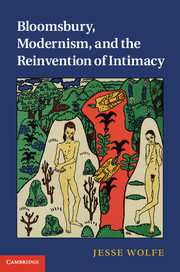Book contents
- Frontmatter
- Contents
- List of figures
- List of tables
- Acknowledgments
- Introduction: narrating Bloomsbury
- PART I PHILOSOPHICAL BACKGROUNDS
- PART II DEFEATED HUSBANDS
- PART III DOMESTIC ANGELS
- 5 Woolf's sane woman in the attic
- 6 A return to essences
- Conclusion: the prescience of the two Bloomsburies
- Appendix
- Notes
- Bibliography
- Index
Conclusion: the prescience of the two Bloomsburies
from PART III - DOMESTIC ANGELS
Published online by Cambridge University Press: 05 December 2011
- Frontmatter
- Contents
- List of figures
- List of tables
- Acknowledgments
- Introduction: narrating Bloomsbury
- PART I PHILOSOPHICAL BACKGROUNDS
- PART II DEFEATED HUSBANDS
- PART III DOMESTIC ANGELS
- 5 Woolf's sane woman in the attic
- 6 A return to essences
- Conclusion: the prescience of the two Bloomsburies
- Appendix
- Notes
- Bibliography
- Index
Summary
There are of course more than two Bloomsburies: future critics will formulate other accounts of the group and its relations to modernism, modernity, and post-World War Two culture than I do, with my categories of anti-essentialist accommodations and essentialist disenchantments. By gathering, under the anti-essentialist heading, texts associated both with the group's inner circle (Moore, Woolf) and with its satellites (Freud, Lawrence), and by doing the same under the essentialist heading (Forster the inner-circle member, Sackville-West the satellite), I aim to evoke a few of the many ways in which Bloomsbury and modernism exert gravitational influences on one another.
By applying these labels to texts rather than writers, I emphasize how multifaceted each of these writers was. Lawrence expressed essentialist ideas in his essays and anti-essentialist ones in his fiction; these tensions make all his works more exciting. Nowhere do Forster and Sackville-West treat sexuality in quite such Victorian ways as in Howards End and All Passion Spent, which makes these two works illustrative of the group's ambivalence about the reinvention of intimacy. Without an essentialist counterpoint to its Freudian and Woolfian essence-dissolving points, this set of six writers – one possible sample of Bloomsbury and its extensions – would make a blander music. It is because they conjure, both individually and in tandem, the paradoxes of modern couplehood, love, and friendship that these compositions have an uncanny prescience.
- Type
- Chapter
- Information
- Bloomsbury, Modernism, and the Reinvention of Intimacy , pp. 192 - 199Publisher: Cambridge University PressPrint publication year: 2011



